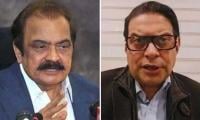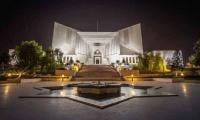Islamabad: There is a need to study the causes of proxy wars, and what are the potential impacts of such wars on the overall conflict.
These thoughts in a daylong international seminar on ‘Strategic Dimensions of Peace and Conflict in South Asia and the Middle East,’ organised by Pak Institute for Peace Studies (PIPS), an Islamabad-based think tank, participated by prominent national and international scholars. Prof. Shahram Akbarzadeh, Deakin University, Australia, argued there is significant gap in the literature on non-state actors.
He called for empirical research, along with concrete policy suggestions, on the topic, so as to mitigate the conflicts in the region, in particular South Asia and Middle East.
Speakers grappled at the notion of non-state actors and proxy wars: Pak Institute for Peace Studies director Muhammad Amir Rana said non-state actors often evoke memories of violent elements.
This despite that as per definition, non-state actors include organizations working for human rights. Prof. Syed Rifaat Hussain, Department of Government and Public Policy, NUST, said the term “proxy wars” is a contested notion.
There is no universal agreement on its definition, nor on the set of circumstances behind such wars. Interestingly, he said, proxy wars are as old as the phenomena of conventional war itself.
Speakers noted proxy wars are instruments of state power. As to why states go for it, it was argued, it is because they are often cheap undertaking to change the status quo. Participants noted over the decades, much of the conflict involves non-state actors.
Interstate conflict, on the other hand, has declined. In recent times, he said tit-for-tat tactics on behalf of such actors have reduced their appeal. Dr. Ibrahim Fraihat, Doha Institute of Graduate Studies, Doha, termed proxy war as an arms conflict between two parties, though one of them is not directly involved.
This way, domestic conflicts are escalated by external power intervention. At the same time, proxy war, if unresolved, can take the shape of conventional war, the most significant example was of Vietnam War. In contemporary times, he lamented, the Middle East has been rendered a stock market of proxy organizations.
William Gueriache, Associate Professor American University in the Emirates Dubai, said on surface, all states support open diplomacy and multilateralism. Yet the survival of patronage has paved the way for foreign intervention during conflicts in the whole Middle East.
Dr. Marwan Kablan, Director Policy Analysis at the Arab Center for Research and Policy Studies Doha, also hinted multiplicity of actors involved in Syrian conflict, calling it as mother of conflicts in the region. It was said that wars cannot be ended unless patron states achieve their interests.
Dr. Shaheen Akhtar, Professor National Defence University Islamabad focused on the apprehension of Pakistan about India’s involvement in Afghanistan. She said Pakistan’s uneasy relationship with Kabul reinforces a perception of encirclement while growing US-India strategic cooperation further aggravates these apprehensions. Dr. Muhammad Riaz Shad, National University of Modern Languages (NUML) Islamabad, said fighting through proxies gives
states an opportunity of deniability.
Representational image of a locked door. — APP/FileLAHORE:The Lahore Development Authority on Thursday sealed...
Representational image of a jail inmate. — APP/FileLAHORE:Lahore Police Thursday arrested two accused for torturing...
Representational image of a test. — Facebook@kemulahore/FileLAHORE:The recruitment process for constables in the...
The image shows History by Night tour event organised by Walled City of Lahore Authority . —...
The Punjab Food Authority officials disposing of the substandard milk. — Screengrab via YouTube/Geo NewsLAHORE:The...
A representational image shows seized drugs. — AFP/File LAHORE: Lahore Police Thursday released 2024 performance...







